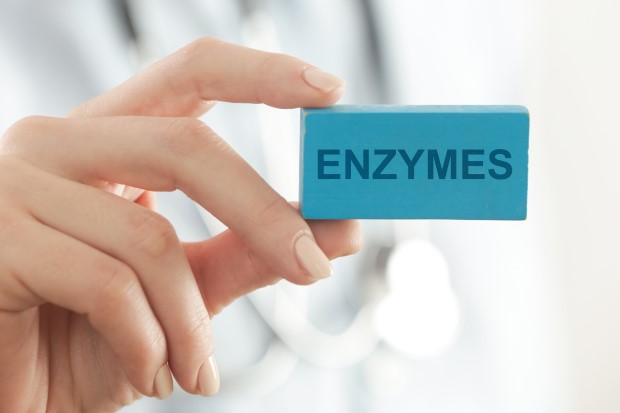
Today you can change your health in a positive direction by simply eating something live every time you have a meal or snack. Enzymes are the most essential component of our bodies. Enzymes help us breathe, drink, eat, and digest.
Enzymes are present in uncooked food. Once food has been cooked, the high temperature destroys the enzymes. Raw foods (foods that are alive or the “live” component of your meal) contain enough natural food enzymes to digest food. When cooked, the enzymes in food are inactivated and can no longer assist the body in digestion. Eating raw food is easiest with vegetables and fruit. Nuts, dairy, sushi, and some meats are served raw or rare, which is also helpful.
There are three main categories of enzymes: (1) digestive enzymes, (2) food enzymes, and (3) metabolic enzymes. We are going to concentrate on the first two. There are three main types of digestive enzymes: (1) protease, (2) amylase, and (3) lipase. Each one has a different food component that it breaks down. Protease breaks down proteins, amylase breaks down carbohydrates, and lipase breaks down fats (also called lipids).
The body does produce the enzymes we just covered, but here’s the problem: the body doesn’t create an infinite amount of enzymes. We lose digestive enzymes through body waste, sweating, and other functions of the body that naturally work to stabilize, detoxify, and repair. So the strength and ability of the enzymes to do their work declines. In the processes of aging or with a lifestyle of poor eating habits, the body becomes less efficient in producing digestive enzymes. Processed food, microwave cooking, and environmental pollution can cause free radicals that lower the body’s ability to produce enzymes as well.
Aging accelerates when the diet is short of, or missing, enzymes. The body cannot keep up with the demand, so acid reflux, indigestion, and bloating become prevalent issues. In order to support your body’s natural process of ingesting, digesting, and repairing and regenerating healthy cells, two easy changes can be made to your diet.
First, eat a “live” food as part of every meal. Ultimately, minimize cooked food or at least cut back on cooked food portions and increase your raw components. Give the body a break and a much-needed boost to support the natural healing process and slow aging. Second, faithfully take a good digestive enzyme supplement to aid in the digestion of all foods. Make sure the digestive enzyme supplement has the three main digestive enzymes we reviewed (protease, amylase, and lipase). If you are treating an autoimmune or inflammatory disease, protease, which enables protein digestion, is imperative. Protease is often used as a separate therapy as it alleviates autoimmune and inflammatory conditions as well as pain.
Many believe they eat fairly well yet still have digestive problems. If digestion isn’t happening properly, undigested food can seep into the bloodstream, which causes the immune system to react. There are many symptoms that provide evidence that a simple digestive enzyme is needed. For starters, discomfort and lack of energy may be present, but there are others to consider: arthritis, bloating, constipation, cravings, diarrhea, dull or thinning hair, depression, headaches, heartburn, hives, gas, rashes, and weak and cracked nails.
If the body is not functioning properly for any reason, taking digestive enzymes is easy and makes good sense. It will take a huge burden off the body and allow more nutrients to be broken down from food to promote healing and produce more energy. Once the body is digesting properly, the body needs less food because nutrients are readily absorbed; therefore, less food needs to be consumed.
Plant-based digestive enzymes are safe for adults and children. Adults should take digestive enzymes immediately before each meal. For children, taking a digestive-enzyme formula twice a day with a meal is good. Simply adding enzymes to a health regimen can dramatically change life for the better. It’s so exciting, isn’t it?
Digestive enzymes are found in humans, animals, and carnivorous plants as well as inside every cell. In the cell, the function of enzymes is to maintain the survival of the cell. Salivary glands secrete digestive enzymes, which is why it’s so important to slow down and chew, chew, chew our food. The cells in the lining of the stomach, pancreas, and glands in the small intestine also secrete digestive enzymes.
Some examples of other digestive enzymes are galactosidase, which digests the starches that are hard to digest; cellulose, which aids in digestion of the cellulose fiber in fruits, grains, seeds, and vegetables; glucoamylase, which helps digest maltose, the sugar in grains; invertase, which aids in the digestion of sucrose (sugar); lactase, which digests lactose, or milk sugar; and peptidase, which helps digest casein in milk, gluten in grains, and pectin in fruits. Believe it or not, there are more, but the point is that enzymes cover a lot of bases in assisting the body in digesting and utilizing fats, proteins, sugars, and starches from food.
So, down to the facts: If we don’t get enough raw foods and we don’t eat slowly and chew food well, the body can’t make enough enzymes to make up the difference. It’s important to do these things, and if you have any symptoms or are experiencing illness or disease, you should also take digestive enzymes for the optimum digestion of food.
Some foods aggravate the body, cause inflammation, and are difficult to digest, and they cause disease. Incredibly, one of these is wheat. Many think patients suffering with celiac disease are the only ones affected by the ingestion of wheat. This could not be further from the truth. Wheat is a hot topic in the nutritional healing world and rightfully so.



